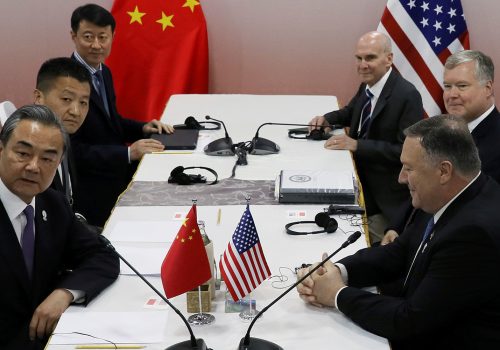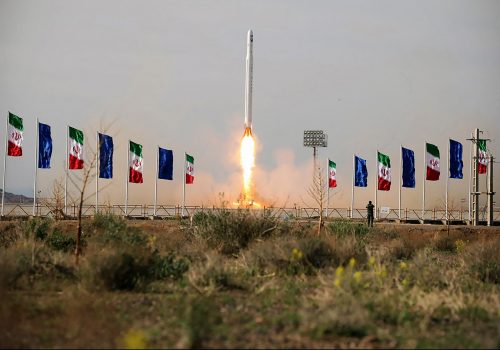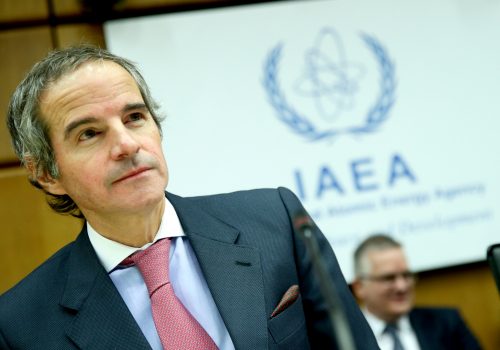Why is Iran concerned about the peace agreement between the UAE and Israel?
The landmark agreement between the United Arab Emirates (UAE) and Israel to begin the process of normalization came out as a diplomatic victory for both countries and the United States. The deal establishes the UAE as the third Arab country to have normal relations with Israel, in exchange for Israel’s commitment to “suspend” the highly controversial plans for the annexation of the West Bank. For the Islamic Republic of Iran, however, the announcement has come as bad news.
The agreement primarily focuses on tourism, trade, technology, and other non-military areas. However, given the shared fear of Iran, it would make sense for two of the largest military buyers of US military equipment to explore cooperation in security and military areas. In this context, while the Mossad spy chief’s trip on August 18 to the UAE can be viewed as a warning to Tehran, it demonstrates that the recent agreement has a strong potential to be expanded to the security field as well. Furthermore, reports indicate that the UAE has previously expressed an interest in acquiring Israel’s formidable Iron Dome missile defense system, which could enable the UAE to reduce the threat of Iran’s ballistic missile arsenal. Interestingly, reports indicate that the Trump administration, despite Israel’s objections, is pushing for the sale of the F-35 to the UAE. If this materializes, UAE will become the second Middle Eastern country to be equipped with the world’s most advanced fighter aircraft, which could be an additional source of concern for Iran.
Unsurprisingly, the Iranian government reacted angrily to the news. Iranian President Rouhani warned that “if the agreement leads to expanded Israeli influence in the region, things will change and they will be dealt with in a different manner.” Chief of Iran’s Armed Forces General Staff (AFGS), Major General Mohammad Baqeri also warned that “if anything happens in the Persian Gulf and the national security of Islamic Republic of Iran is endangered—even slightly—we will blame the UAE, and will not tolerate it.” However, the UAE’s Foreign Minister has publicly announced that the agreement with Israel is not “about Iran,” but a matter of sovereignty decision.
More ominous for Tehran are the reports that an increasing number of Arab countries, presumably Bahrain and Oman, would soon follow UAE’s path in normalizing relations with Israel. While Saudi Arabia has announced that it will not recognize Israel until it has signed an internationally recognized agreement with Palestinians, it is on the list of potential candidates which could agree to eventually recognize Israel. Saudi officials hold a deep mistrust of Iran, and have in the past warned of Iran’s attempts to restore the “Persian Empire.” The perceived threat from Iran provides a strong incentive for the Kingdom to seek broader cooperation with Israel. In fact, reports indicate that the two countries have in the past secretly cooperated against Iran. In essence, it seems that Israel and the Sunni Arab countries of the region are ‘balancing’ against Shia Iran.
Some Iranian politicians have already warned of the looming threat. In this context, Ali Motahari, a former Iranian lawmaker tweeted that “Aside from Emiratis’ treacherous act, we also deserve some blame. We have scared the Arabs and pushed them towards Israel. An example of this is storming the Saudi embassy and setting it ablaze. The policy of making Iran the enemy has been fruitful. This needs to be remedied.” Similarly, Mohammad Ali Abtahi, a former vice president to Mohammad Khatami (1996-2004) cautioned that “we are finding ourselves in a situation where our neighboring Arab countries are turning to Israel to confront Iran.”
The emerging alliance has a strong potential to shift the regional balance of power in favor of Iran’s adversaries, namely Saudi Arabia and Israel, which in turn, could increase Tehran’s sense of insecurity. The ongoing developments could establish an array of Sunni Arab countries accommodating to Israel on the southern shores of the Persian Gulf, which has long served as Iran’s strategic lifeline. This is partially of Iran’s own making. Tehran’s misguided policy towards the Israeli-Palestinian conflict, and provocative statements towards Israel, have long worked against its national interests. It is quite perplexing that Iran, while portraying itself as the champion of the Palestinian cause, has long maintained warm relations with India and China, both of which have a record of discriminating against their Muslim minorities. Notwithstanding its ill-advised approach, the new developments will justifiably increase Iran’s sense of insecurity, which could prompt it to act more aggressively in the Persian Gulf. This in turn, can set into motion a very unstable and dangerous cycle of security competition.
The new arrangements could also prompt Tehran to seek to improve its relations with Ankara, which also responded angrily to the news of the peace agreement. President Recep Tayyip Erdogan even threatened to suspend ties with UAE and recall the Turkish ambassador to Abu Dhabi. Meanwhile, Ankara has had frosty relations with Tel Aviv for years and does not currently have an ambassador to Israel. Turkish-Saudi relations since the gruesome murder of Saudi journalist Jamal Khashoggi in the Saudi consulate in Istanbul remain contentious. In fact, Mohammed bin Salman (MBS), the Crown Prince of Saudi Arabia has described Turkey as a member of “contemporary triangle of evil” along with Iran and extremist religious groups.
Ankara’s relations with the United States have also gone sour over Ankara’s purchase of S-400 air defense systems from Russia. In response to Turkey’s intransigence, the Trump administration halted the delivery of F-35 fighter aircraft to Turkey. Furthermore, some American politicians have threatened Turkey with suspension from NATO military alliance. Meanwhile, despite the tumultuous relationship, Iran and Turkey have maintained strong economic and trade relations. Iran even stood by Erdogan’s side when his government was put at risk by a military coup in 2016. As the region is witnessing new political arrangements, it would make strategic sense for Tehran to attempt to offset the emerging security environment by improving its relations with Turkey.
More prudently, Iran could seek to improve its damaged relations with the UAE and Saudi Arabia. A regional security initiative, amenable to all concerning parties will not only help reduce tensions but could also establish a platform for cooperation on issues of mutual interest. The coronavirus pandemic provided a rare opportunity for Iran and the UAE to display their good will. In March, the UAE sent two shipments of humanitarian assistance to Iran to fight the COVID-19 outbreak in Iran, the largest in the Middle East. Recently, Iranian Foreign Minister Mohammad Javad Zarif, held a “substantive and friendly” virtual talk with his Emirati counterpart Abdullah Bin Zayed to discuss regional issues—the highest level meeting since the UAE broke diplomatic relations with Iran in 2016. In the case of Saudi Arabia, however, MBS’ anti-Iran rhetoric has been a major impediment for bilateral talks between the two indispensable pillars of stability in the Middle East.
Despite the media frenzy over the recent agreement between Israel and UAE, the agreement is unlikely to bring about a fundamental transformation in Arab-Israeli conflict, as long as the fate of the two-state solution remains murky. Rather, the agreement seems to be based primarily on the mutual animosity that the Sunni Arab countries of the Persian Gulf and Israel hold toward Iran. This can also be seen as a political victory for US President Donald Trump, who has practically failed on much of his major foreign policy promises and can certainly bolster his position in the upcoming US presidential election in November. A second Trump term will serve the interests of UAE, Saudi Arabia and Israel, all known to be against any US engagement with Iran.
Sina Azodi is a Non-resident fellow at the Atlantic Council and a foreign policy advisor at Gulf State Analytics. He is also a PhD Candidate in International Relations at University of South Florida. Follow him on Twitter @Azodiac83.
Subscribe for more from IranSource
Sign up for the IranSource newsletter, which provides a holistic look at Iran’s internal dynamics, global and regional policies, and posture through unique analysis of current events and long-term, strategic issues related to Iran.
Image: Sheikh Abdullah bin Zayed Al Nahyan (left) in a meeting with Hassan Rouhani on November 28, 2013 (ISNA)


